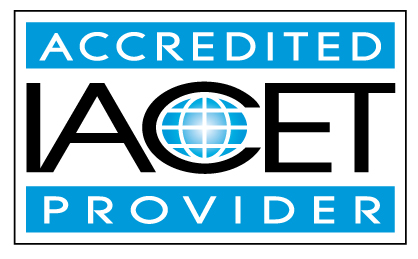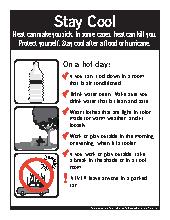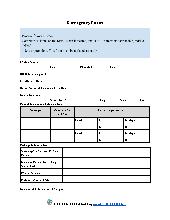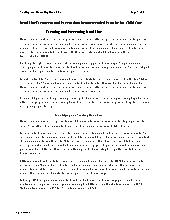45-Hour School Age Curriculum - $399
This course is designed to equip students with the essential skills required for working effectively in school-age child care programs. It covers a range of topics, including curriculum planning, selecting age-appropriate materials, and employing effective methods when working with children between the ages of six and thirteen. By the end of the program, students will be well-prepared to create engaging and developmentally appropriate learning experiences for school-age children, fostering their growth and academic development. Whether you are aspiring to become an after-school program coordinator or a dedicated educator for school-age children, this course provides the foundation for success in this vital role.
*Maryland Providers*
This Curriculum Training (this is the online version of the instructor-led Methods and Materials training) satisfies half of the MSDE requirement of 90 hours for child care teachers and directors. This course and a 45-hour growth and development course are required to complete the 90-hour certification for child care. If you have been issued a voucher from MSDE for this course it MUST be completed 2 weeks before the expiration date that is on your voucher. Please check your voucher for this date. Training Approval number PSO-30299 Aligns with MD Staff Credential levels 2-4. Earns 4.5 CEUs/45 clock hours.
By the end of this training, the learner will be able to:
- Describe common myths and misconceptions about time management in child care.
- Give examples of ways to apply and model ethical behavior and professional integrity with families.
- Identify and contemplate bias and explore anti-bias approaches that support working with children and families.
- Demonstrate understanding of an IEP and removing barriers
- Identify staff evaluation tools and evaluation timelines that will assist with staff supervision and monitoring performance
- Identify tips and strategies for successful mixed-age group instruction.
- Demonstrate the elements of positive respectful relationships that include warm, nurturing interactions with children.
- Demonstrate an understanding of concepts within the activity and content area for the visual arts for school-age.
- Demonstrate understanding of inclusionary practices for school-age children.
- Demonstrate how environment and equipment modifications support individual needs for school-age children.
- Identify the challenges and solutions for shared space environments.
- Identify the challenges of developing an appropriate school-age environment.
- Identify strategies that promote health and wellness for school-aged children.
- Identify safety management and supervision practices of school-aged children.
- Identify what to avoid during a conference.
- Describe the process of creating and communicating rules within the classroom.
- Define self-esteem and identify issues and strategies for support of school age children.
- Identify types of bullying affecting school aged children.
- Describe strategies to encourage positive behaviors in the classroom.
- List methods to help you plan a conference.
- Demonstrate understanding of how teacher expectations/behaviors can contribute to student achievement.
- Describe strategies to support the development of mathematical skills in school age children.
- Identify the benefits of field trips and the proper procedures for field trip planning.
- Identify the elements of an appropriate lesson plan/activity for school age children.
- Demonstrate an understanding of how to create a natural outdoor classroom that supports child development in all areas.
- Demonstrate understanding of strategies that utilize good time management practices for teachers and child care providers.
- Recognize strategies for effective conferences with families.
- Give examples of strategies teachers can use to communicate with parents regarding challenging behaviors.
- Describe the importance of social emotional skill development in children entering kindergarten.
- Give examples of ways to apply and model ethical behavior and professional integrity with staff and administrators.
- Explain the role of respect in children’s behavior.
- Demonstrate knowledge of appropriate reporting process.
- Identify the signs of child abuse and neglect.
- Identify different learning styles and how to differentiate instruction to meet a child's needs.
- Identify essential elements for effective communication with school-age children.
- Identify stages and milestones of physical and cognitive development ages 6-13.
- Demonstrate an understanding of physical growth and development in school age children and the impact it has on programming.
- Identify curriculum and activity resources specific to school-age child care.
- Identify the components of a lesson plan using WIPPEA.
- Demonstrate an understanding of how promoting an integrated curriculum promotes development.
- Describe vehicle safety standards for school-age children
- Explain the historical context of emergent curriculum from its origins in the Reggio Emilia approach.
- Define the Cycle of Inquiry and how it can be used to plan emergent curriculum.
- Identify the importance of math instruction with young children.
- Demonstrate an understanding of concepts within the activity and content area for language/literacy
- Identify strategies to increase parent involvement in the school-age setting.
- Demonstrate an understanding of emergent curriculum.
- Recognize the importance and components of an effective parent questionnaire.
- Distinguish between praise and encouragement.
- Identify teaching skills and techniques using the “I Message”
- Identify and demonstrate positive guidance techniques that promote social competency and pro-social behavior.
- Identify the key elements of environmental design in a school-age program.
- Demonstrate an understanding of how to develop and implement a daily schedule for school-age children.
- Describe a classroom management plan that promotes positive reinforcement and clear expectations for the school-age setting
- Demonstrate an understanding of the ADA.
- Identify health and safety curricular resources for the school-age setting
- Identify resources for referral and services for the school-age setting.
- Demonstrate an understanding how to maintain a safe environment under the guidance of the Office of Child Care Regulations.
- Demonstrate an understanding of child care policies, licensing regulations, and legal and advocacy issues.
- Identify positive leadership techniques.
- Demonstrate an understanding of ethical conduct: Statement of Commitment & Preamble
- Give examples of tools that record and communicate critical information to other staff and families.
- Identify the components of positive relationships with children, co-workers and families.
- Demonstrate communication skills that enable intercultural communication, including effective listening skills
- Identify the recommended feeding patterns of school-age children.
- Explain the impact of stress on health and environment.
- Recognize the importance of problem solving and conflict resolution strategies with community members and families
- Identify communication issues that are common in the early care and education environment
- Describe open-ended art concepts.
- Demonstrate an understanding of the information that should be communicated regularly with staff, parents, and the community
- Criteria to earn CEUs:
- Certificates are awarded when the following criteria have been met by the learner:
- Class has been paid in full
- All material has been reviewed
- All review questions and final test have been completed with a passing score of 80% or higher.
- Learning Assessment Method:
- Learners will be assessed through questions after every section is completed. Learners will not be
allowed to proceed to the next section of the training until all questions have been answered correctly.
Learners will be presented with a final test composed of true/false and multiple choice questions.
Upon successful completion of the training, learners will receive their certificate by email.
- Learning Methodology:
- Online material will be presented in the form of slides,
accompanied with speech. Videos will be used to demonstrate ideas and concepts. Charts and tables
will be used for illustration.
- Logistics/Required Technology:
- A stable internet connection is required for the completion of this course. Users are highly encouraged to take their online course on Google Chrome on either a laptop or desktop computer. Speakers and/or headphones are also required to hear speech.
- Payment Policy:
- Payments need to be made in full. No refunds will be issued after starting the class.
- Proprietary or conflict of interest disclosure:
- Unless otherwise stated in the course description none of H & H subject matter experts and editor has any conflict or proprietary interests related to the material they prepared in this course.
- Support Services:
- Please visit our contact us page
You are purchasing a session of an online training that includes online assessments. Your certificate will be emailed to you once you pass the final exam with a passing grade of 80%.
Your certificate will bear the name you provided to us when you signed up. For support and questions regarding the material presented in this class please contact us at [email protected]. Please consult our frequently asked questions page for other questions or feel free to contact us.
No prerequisites are required for the completion of this course.
Hours breakdown
45 CURTopics / Categories
CurriculumPre-Service Training
Admin
Family Child Care
Group Admin
Not Applicable
School age
Basic
Latest Jobs
- MSDE Approved 45 Hour School AGE Methods and Materials
- Big discounts on 90-Hour School Age!
- 90 Hour-School Age Training
- Who needs to take the 45 Hour Infant and Toddler Curriculum Training
- 45 Hour Pre-School and Child Growth and Development Training to be a Preschool Teacher in a Daycare
- Why Take a 45 Hour Child Care Training?
- 45 Hour Training: Lead Caregiver Requirements in Michigan
- MD $100 off 45-Hour Zoom trainings
- 45 hour Growth and Development
- What you need to be a school age teacher in Md Child Care
- School Age Programs
- Your Guide to the 45-Hour Child Care Courses Online in Florida
- School Days, Fun Ways: Designing a Curriculum for the Big Kids
- Introducing: The 45-Hour Director-Administration Course
- 45 hours Methods and Materials course equivalent
- How to Manage a Classroom with Multiple Age Groups
- Texas 24 Hour Pre-Service Training for Child-Care Workers
- Tiny Tots, Big Learning: Crafting Curriculums for the Littlest Learners!
- Sign Up for First Aid and CPR Training with ChildCareEd: A Lifesaving Skill for the New School Year










